
Annual Review of Criminology
Scope & Guideline
Unveiling Insights in the World of Criminology.
Introduction
Aims and Scopes
- Comprehensive Review of Criminological Theories:
The journal consistently focuses on reviewing and synthesizing various criminological theories, exploring their relevance and application in contemporary society. - Interdisciplinary Approaches:
It embraces an interdisciplinary perspective, integrating insights from sociology, psychology, law, and public policy to address complex issues related to crime and justice. - Empirical Research and Evidence-Based Practices:
The journal emphasizes the importance of empirical research and evidence-based practices, promoting studies that assess the effectiveness of interventions and policies within the criminal justice system. - Social Justice and Inequality:
A core area of focus is the examination of social justice issues, including systemic inequalities within the criminal legal system, and how these impact various marginalized communities. - Policy Implications and Reform:
The journal aims to inform policy-making by discussing the implications of research findings for criminal justice reform, emphasizing the need for evidence-informed policies.
Trending and Emerging
- Racial Justice and Systemic Inequality:
Recent publications highlight a significant increase in discussions surrounding racial justice and systemic inequalities within the criminal justice system, emphasizing the need for reform and equity. - Trauma-Informed Approaches:
There is a growing emphasis on trauma-informed perspectives in understanding the experiences of individuals within the criminal justice system, focusing on the long-term impacts of trauma on crime and rehabilitation. - Impact of Societal Changes on Crime:
Emerging themes include the examination of how societal changes, such as the COVID-19 pandemic, affect crime patterns and the functioning of the criminal justice system. - Restorative Justice Practices:
The journal is increasingly exploring restorative justice as a viable alternative to traditional punitive measures, emphasizing its transformative potential and community-based approaches. - Technological Advances and Crime:
A notable trend is the integration of discussions around technology, such as predictive policing and surveillance, and their implications for crime and justice practices.
Declining or Waning
- Historical Criminology:
Although historical perspectives have been important, recent publications suggest a waning focus on purely historical analyses of crime, as contemporary issues take precedence. - Traditional Crime Types:
There seems to be a reduced emphasis on traditional crime types such as property crime, with more attention shifting towards complex social issues and systemic challenges within the criminal justice system. - Crime Prevention Strategies:
The exploration of conventional crime prevention strategies appears to be less frequent, as the journal increasingly prioritizes innovative, evidence-based approaches and social justice considerations. - Individual-Level Factors:
Research focusing on individual-level factors (e.g., personality traits, biological factors) as primary predictors of criminal behavior seems to be declining in favor of broader societal and structural analyses. - Classic Theoretical Frameworks:
Although foundational theories remain relevant, there is a noticeable trend towards exploring alternative and contemporary theoretical frameworks, leading to a reduction in the focus on classical criminological theories.
Similar Journals
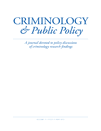
Criminology & Public Policy
Bridging Theory and Practice for a Safer SocietyCriminology & Public Policy, published by Wiley, is an esteemed journal that plays a pivotal role in the interdisciplinary fields of law, public administration, and literature. With a focus on innovation and empirical research, this journal addresses critical issues surrounding crime and justice while influencing policy decisions globally. The journal boasts a prestigious impact factor, reflecting its significant contribution to academic discourse, particularly noted for its top quartile rankings in the fields of Law, Literature and Literary Theory, and Public Administration in 2023. As a resource for researchers, practitioners, and policymakers, Criminology & Public Policy aims to bridge the gap between theory and practical application, presenting cutting-edge analyses and insights that are vital for addressing contemporary societal challenges. By providing a platform for rigorous scholarship, this journal supports the advancement of knowledge and fosters informed discussions that shape effective public policies.
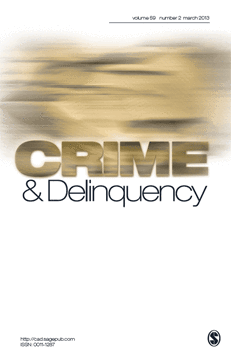
CRIME & DELINQUENCY
Transforming understanding through rigorous analysis.CRIME & DELINQUENCY, published by SAGE PUBLICATIONS INC, is a premier journal dedicated to advancing the study of criminology and criminal justice. With an esteemed ISSN of 0011-1287 and E-ISSN 1552-387X, this influential journal has been a vital resource since its inception in 1955, continuing to engage in rigorous research and discourse through to 2024. Recognized with a Q1 ranking in both Law and Pathology and Forensic Medicine, CRIME & DELINQUENCY boasts an impressive Scopus ranking, placing it in the top 8% of journals in Social Sciences - Law and the top 31% in Medicine - Pathology and Forensic Medicine. This journal serves as an essential forum for researchers, professionals, and students to explore pressing issues related to crime, delinquency, and their societal implications. Although not an open-access journal, it offers a valuable repository of insightful research and analysis that informs practices and policies within the field. To stay abreast of the latest findings and contribute to the ongoing discourse, CRIME & DELINQUENCY is a must-read for all committed to understanding and addressing criminal behavior in society.

CRIMINAL JUSTICE STUDIES
Pioneering insights into contemporary justice systems.CRIMINAL JUSTICE STUDIES, published by Routledge Journals, Taylor & Francis Ltd, is a leading journal in the field of criminal justice and law, boasting an impressive 2023 Q1 category ranking. With an ISSN of 1478-601X and an E-ISSN of 1478-6028, this journal serves as a pivotal platform for disseminating high-quality research that spans various dimensions of criminal justice, including policy, theory, and practice. Since its inception in 2007, CRIMINAL JUSTICE STUDIES has become a vital resource for scholars, practitioners, and students, addressing contemporary challenges and developments within the field. With a remarkable Scopus rank of #157 out of 1025 in Law, positioning it within the 84th percentile, this journal is dedicated to advancing knowledge and fostering critical discourse. Although it does not offer open access, the insights shared within its pages are invaluable to those seeking to deepen their understanding of criminal justice systems worldwide. Based in the United Kingdom and running through 2024, CRIMINAL JUSTICE STUDIES is essential for those engaged in research and practice, pushing the boundaries of knowledge and contributing to the evolution of criminal justice scholarship.

Revija za Kriminalistiko in Kriminologijo
Unveiling Innovations in Crime and Social PsychologyRevija za Kriminalistiko in Kriminologijo is a prominent academic journal dedicated to the fields of criminalistics, criminology, law, and forensic medicine, published by the Ministry of Interior Republic Slovenia. With its inception in 1981, the journal has served as a pivotal platform for disseminating research findings and innovative ideas relevant to crime and justice issues, particularly in the context of Slovenia and the wider region. Despite its current Q4 ranking in various categories, including Law and Pathology & Forensic Medicine, Revija za Kriminalistiko in Kriminologijo remains essential for emerging scholars and professionals seeking to contribute to the discourse in forensic science and social psychology. Although the journal does not offer open access options, it continues to publish rigorous peer-reviewed articles that significantly impact the field, making it a valuable resource for researchers, practitioners, and students alike. Scholars can access the research at the journal's address in Ljubljana, Slovenia, thereby fostering interdisciplinary collaboration and knowledge sharing.
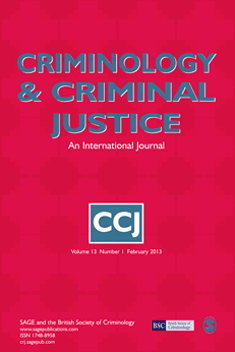
Criminology & Criminal Justice
Connecting Scholars and Practitioners in the Quest for JusticeCriminology & Criminal Justice is a leading academic journal published by SAGE Publications Ltd that serves as an essential resource for scholars, practitioners, and students in the field of criminology and legal studies. With its ISSN 1748-8958 and E-ISSN 1748-8966, this journal has established itself as a crucial platform for innovative research, analysis, and discourse, consistently maintaining a prestigious Q1 ranking in Law. Spanning a diverse range of topics within criminology and criminal justice, it promotes interdisciplinary perspectives that reflect current trends and challenges within the domain. With a notable 93rd percentile ranking in Scopus, the journal ensures that its publications meet rigorous academic standards, fostering the advancement of knowledge and practice in the field. Based in the United Kingdom and catering to a global audience, this journal enhances scholarly communication and collaboration, making it an indispensable tool for those dedicated to unraveling the complexities of crime and justice.

Critical Criminology
Advancing Critical Insights in Criminology.Critical Criminology is an esteemed academic journal published by Springer, focusing on the interdisciplinary examination of crime and justice through a critical lens. With its ISSN 1205-8629 and E-ISSN 1572-9877, this journal provides a platform for innovative research that challenges mainstream criminological perspectives and explores the socio-political dimensions of crime. Recognized for its scholarly rigor, it holds a prestigious Q1 ranking in Law and a Q2 ranking in Sociology and Political Science, showcasing its vast influence in the field. The journal serves as an essential resource for researchers, practitioners, and students interested in the complexities of crime and the multitude of factors influencing criminal behavior. Although it operates under a subscription model, its significance is underscored by high performance metrics, including a remarkable 88th percentile rank in the Law category of Scopus, affirming its critical role in advancing criminological scholarship. Based in the Netherlands, Critical Criminology continues to attract contributions that shed light on contemporary issues and pursue paths of social justice and reform.
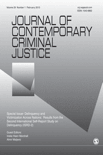
Journal of Contemporary Criminal Justice
Exploring the Intersection of Law and Society.Journal of Contemporary Criminal Justice is a leading academic publication within the field of criminal justice, published by SAGE Publications Inc. This esteemed journal, bearing the ISSN 1043-9862 and E-ISSN 1552-5406, has been contributing significantly to the discourse on contemporary issues in justice systems since its inception in 1978. Renowned for its rigorous peer-reviewed articles, the journal holds an impressive 2023 ranking within the Q1 quartile in Law, further affirmed by its Scopus rank of #110 out of 1025 in the field of Social Sciences - Law, placing it in the 89th percentile. Though not an open access journal, it provides a vital platform for scholars, practitioners, and students seeking to explore and disseminate pioneering research and practical insights into the evolving criminal justice landscape. The journal covers a wide array of topics, from policy analysis to sociological perspectives, ensuring its relevance across multiple disciplines. With a commitment to advancing the understanding of justice in contemporary society, the Journal of Contemporary Criminal Justice is an essential resource for anyone engaged in the fields of criminology, criminal law, and social policy.
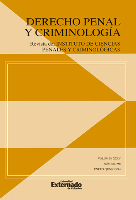
Derecho Penal y Criminologia
Bridging Gaps in Criminal Law ResearchDerecho Penal y Criminología is a distinguished academic journal published by UNIV EXTERNADO COLOMBIA, dedicated to advancing the fields of criminal law and criminology. Since its inception in 1999, this Open Access journal has provided a platform for researchers, practitioners, and students to share innovative ideas, empirical studies, and critical analyses pertinent to contemporary issues in these fields. With a commitment to disseminating valuable research without barriers, the journal serves as an essential resource for those looking to deepen their understanding of criminal justice processes and criminological theories. Although the H-index and specific rankings remain to be detailed, the journal is positioned as a vital contributor to ongoing discussions and developments in penal law and criminology, making it a must-read for professionals seeking to engage with the latest scholarly work. The journal welcomes submissions and encourages robust dialogue among its readership in the quest for justice and effective legal reform.
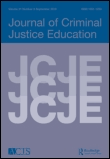
JOURNAL OF CRIMINAL JUSTICE EDUCATION
Empowering Educators to Shape the Future of Criminal JusticeJOURNAL OF CRIMINAL JUSTICE EDUCATION, published by Routledge Journals, Taylor & Francis Ltd, stands as a leading scholarly platform dedicated to the intersection of education and criminal justice. With a robust ISSN of 1051-1253 and an E-ISSN of 1745-9117, this journal provides a vital forum for the dissemination of research, critical analyses, and innovative pedagogical approaches in the field. Indexed in prestigious databases, it boasts impressive rankings—placing in Q3 in Education and Q2 in Law for 2023, with Scopus rankings of #272/1025 in Social Sciences Law and #825/1543 in Social Sciences Education. Addressing the critical needs of criminology professionals and educators, this journal seeks to bridge academic theory and practical application, thus enriching the field with its insightful contributions. While the journal does not offer open access options, researchers and practitioners are encouraged to engage with its comprehensive content to enhance their understanding and teaching within the realm of criminal justice education, fostering a more informed and effective legal system.

Journal of Criminological Research Policy and Practice
Fostering Interdisciplinary Dialogue on CriminologyJournal of Criminological Research Policy and Practice is a pioneering platform dedicated to the exploration and dissemination of knowledge in the interdisciplinary field of criminology. Published by Emerald Group Publishing Ltd, this journal features high-quality research that addresses contemporary issues and innovative practices in areas such as law, public administration, and social psychology. With an ISSN of 2056-3841 and an E-ISSN of 2056-385X, the journal has garnered a notable presence in the academic community, showcasing a Q3 ranking in Law and Sociology & Political Science as of 2023. The journal provides valuable insights for researchers and practitioners alike, advancing the discourse on criminological policy and its implications for society. It serves as an essential resource for those invested in enhancing social justice, informing policy-making, and understanding the complexities of crime within a broader social context. Encompassing research from 2015 to the present and extending into 2024, the journal stands as a critical reference point for future studies and professional practice in criminology.